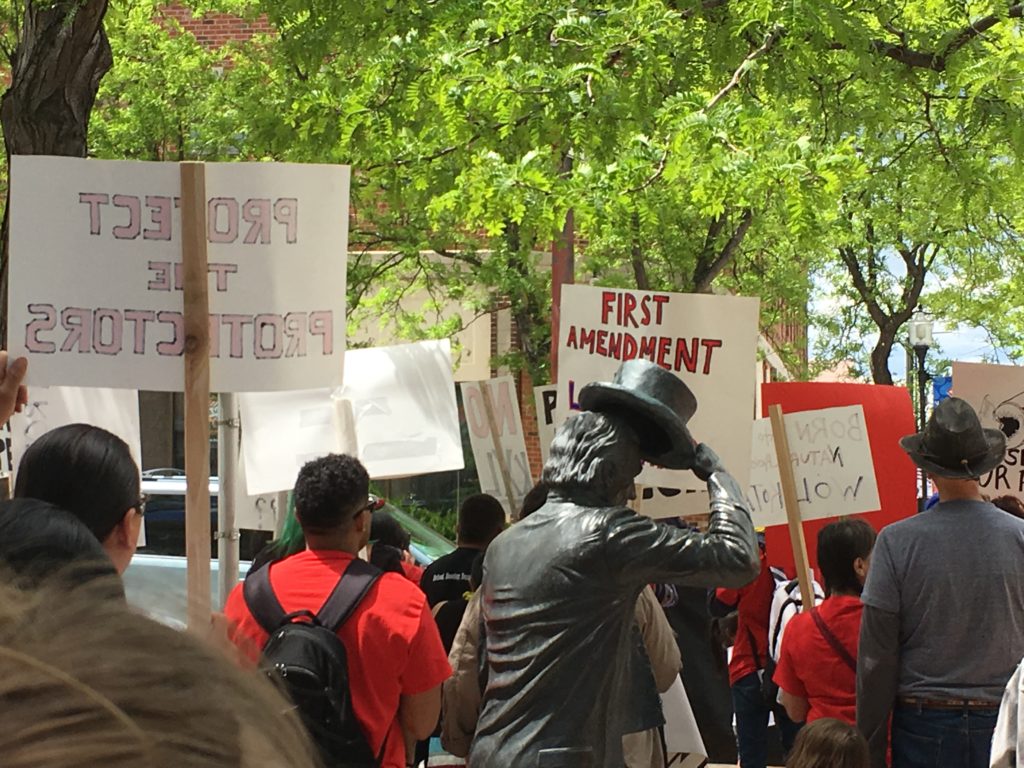
Dakota Rural Action v. Noem, the case against the “Riot Booster” Act and two criminal riot statutes, had its first hearing Wednesday, June 12 in the U.S. District Court for the District of South Dakota in front of the Honorable Judge Lawrence L. Piersol.
The case was filed in early April by the American Civil Liberties Union (ACLU) on behalf of DRA and several other plaintiffs after Governor Kristi Noem signed Senate Bill 189 into law. Due to an emergency clause attached to the bill when it was rushed through in the last few days of the 2019 South Dakota Legislative Session, the law took effect immediately.
Read the full legal complaint HERE.
Aside from Dakota Rural Action, plaintiffs include Indigenous Environmental Network (IEN), NDN Collective, and Sierra Club, as well as individuals Nick Tilsen of NDN Collective and Dallas Goldtooth of IEN. Defendants are Kristi Noem in her capacity of SD Governor, SD Attorney General Jason Ravnsborg, and Pennington County Sheriff Kevin Thom.
Attorneys for the plaintiffs argued a motion for a preliminary injunction on enforcement of the laws while the case moves forward; defendants’ attorneys argued to remove Pennington County Sheriff Kevin Thom from the case, and to move the case to the State Supreme Court.
As expected, Judge Piersol did not rule on any of the motions from the bench, but we expect to see a decision in the near future due to the immediate and ongoing violations of First Amendment rights since SB 189 was signed into law.
Who Wrote This Law? And Who Does it Target?
One of the major problems with the law, as the ACLU’s legal team pointed out in Wednesday’s hearing, is that no one seems to agree on exactly what (or whose) speech and actions the law criminalizes, and that includes the defendants and the legal team assembled by the state to defend the law. This lack of clarity in itself runs afoul of First Amendment rights to free speech and freedom of assembly–if no one can say what speech and acts are prohibited, the law has a chilling effect on all speech and acts, even those that are constitutionally protected.
Judge Piersol, trying to determine the origin of the bill’s confusing language, asked the state’s defense team who wrote the bill. When Deputy Attorney General Richard Williams responded that he couldn’t “specifically” say, Piersol recalled his tenure in the State Legislature and said it didn’t read as though it had been drafted by the Legislative Research Council (LRC). When Piersol asked if the bill had even been looked at by the LRC prior to introduction and passage, the state’s defense replied that they were “unsure.”
Referencing Governor Noem’s press conference on the public release of the bill’s language, Judge Piersol asked if the bill was indeed meant to target “out of state agitators” and “George Soros,” as the Governor claimed. Attorneys for the Governor and Attorney General argued that the law, in fact, only targets speech during an actual riot. Judge Piersol responded that the defendant’s line of reasoning was “strange, and, “that’s not the way I read the statute.”
Plaintiff’s attorneys responded that even if the state’s interpretation was reasonable or accurate (and it wasn’t), not all speech made during a riot is speech that incites or extends that riot. Under such a reading, ACLU Attorney Stephen Pevar, argued, even statements such as, “we’ve all got to calm down” could be prosecutable as “riot boosting.”
Judge Piersol presented the sides with a hypothetical case of a rancher with hired hands confronting a pipeline construction truck and crew that was tearing up the rancher’s pasture and asked, if the rancher and his crew threatened the driver with immediate harm (“You’d better get out of here before we kick your butt”), would that speech constitute “riot boosting” and be subject to penalty under the statute? Responding for the state, Deputy Attorney General Williams replied, “yes.”
Who’s Paying the State to Sue You?
Another concerning issue with the “Riot Booster” law is that it allows for third parties to initiate lawsuits against so-called “riot boosters” under the name of the state or its political subdivisions. Further, it provides a mechanism by which those third parties can fund those lawsuits, and through an accompanying piece of legislation (SB 190–the “PEACE” Fund), be reimbursed for the costs of that litigation and any damages they claim to have suffered at the hands of the so-called “riot boosters” they target.
This means that TransCanada, a foreign corporation, can pay the state to bring legal action against South Dakota residents (or others) under the name of the state or a county in order to extract treble damages from supposed riots by those who oppose them. TransCanada can then apply to be paid back by the state for their expenditures.
While this portion of the law was not discussed at length during the hearing, it raised eyebrows on the bench and in the courtroom for its apparent conflict of interest. Stephen Pevar, attorney for the plaintiffs, summed up all of the disturbing revelations around the law and its impacts by saying, “I just can’t fathom how someone thought this was a valid exercise of the state’s police power.”
Dakota Rural Action will continue to fight for the rights of ALL South Dakotans.
Make a contribution to that fight by clicking HERE.
